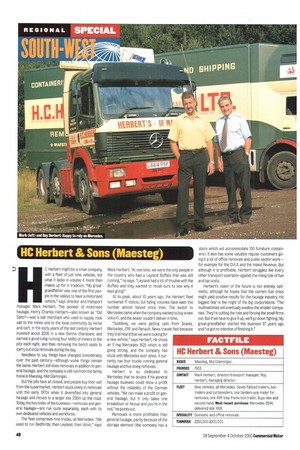C Herbert might be a small company, with a fleet
Page 50

If you've noticed an error in this article please click here to report it so we can fix it.
of just nine vehicles, but what it lacks in volume it more than makes up for in tradition. "My greatgrandfather was one of the first people in the valleys to have a motorised vehicle," says director and transport manager Mark Herbert. This pioneer of motorised haulage, Henry Charles Herbert—also known as "Old Salto"—was a salt merchant who used to supply rock salt to the mines and to the local community by horse and cart. In the early years of the last century Herbert invested about £200 in a new Dennis charabanc and earned a good living running four shifts of miners to the pits each night, and then removing the bench seats to carry out local removals during the day.
Needless to say, things have changed considerably over the past century—although some things remain the same. Herbert still does removals in addition to general haulage, and the company is still run from the family home in Maesteg, Mid Glamorgan.
But the pits have all closed, and people buy their salt from the supermarket. Herbert stuck solely to removals until the early 1970s when it diversified into general haulage and moved to a larger site 200m up the road. Today the two sides of the business—removals and general haulage—are run quite separately, each with its own dedicated vehicles and workforce.
The fleet comprises nine trucks, all Mercedes. "We used to run Bedfords; then Leyland; then Volvo," says Mark Herbert. "At one time, we were the only people in the country who had a Leyland Buffalo that was still running," he says. "Leyland had a lot of trouble with the Buffalo and they wanted to recall ours to see why it kept going!"
At its peak, about 10 years ago, the Herbert fleet numbered 17 Volvos, but falling volumes have seen this number almost halved since then. The switch to Mercedes came when the company wanted to buy a new Volvo FL and the dealer couldn't deliver in time.
"Suddenly, we were getting calls from Scania, Mercedes, ERF and Renault. News travels fast because they'd all heard that we were looking for a new vehicle," says Herbert. He chose an E-reg Mercedes 1625 which is still going strong, and the company has stuck with Mercedes ever since. It currently has four trucks running general haulage and five doing removals.
Herbert is so dedicated to Mercedes that he doubts if his general haulage business could show a profit without the reliability of the German vehicles. "We can make a profit on general haulage, but it only takes one breakdown or hiccup and you're in the red," he points out.
Removals is more profitable than general haulage, partly because of the storage element (the company has a store which will accommodate 150 furniture containers). It also has some valuable regular customers giving it a lot of office removals and public sector work— for example for the DVLA and the Inland Revenue. But although it is profitable, Herbert struggles like every other transport operation against the rising tide of fuel and tax costs.
Herbert's vision of the future is not entirely optimistic, although he hopes that the current fuel crisis might yield positive results for the haulage industry. His biggest fear is the might of the big corporations: "The multinationals will eventually swallow the smaller companies. They're cutting the rate and forcing the small firms out. But if we have to give it up, we'll go down fighting. My great-grandfather started this business 97 years ago and I've got no intention of finishing it."












































































































